Musings on the New York Philharmonic’s North Korea Concert
While only time can tell what the ultimate outcome will be of the New York Philharmonic’s concert in North Korea during our recent Asian concert tour, I think that it will be difficult to overestimate the symbolic importance of what this cultural exchange will ultimately portend for the United States’ relationship with this extremely secretive society. One can understand why some of our government officials felt that the event should be underplayed in terms of its significance, but as someone who was there and who saw the reaction of the North Korean people and leaders who attended the concert, I do not believe that anyone should make the mistake of underestimating what happened, any more than one can underestimate the Philadelphia Orchestra’s trip to China in 1973, an event that I also had the good fortune of being a part of since I was a member of that orchestra at that time. Having been on two such historic trips, I cannot help but be struck by the many similarities between these two events, and just as a small leak can cause the breakdown of a huge dam, this concert may be that first tiny little crack that will prove to be an unstoppable flood within a few years.
The most memorable parts of the tour for me started a few days into our trip when we arrived in Shanghai. The last time I had visited the city was on that historic tour in 1973 that came about when then- President Nixon first opened up relations with mainland China. As I mentioned, I was a member of the Philadelphia Orchestra then, and as one of America’s leading orchestras, we were sent on a State Department tour of China as a goodwill cultural exchange. We visited Beijing (called Peking at that time) and Shanghai, and it was indeed an amazing trip. For one thing, we saw the China of Mao Tse Tung where everyone dressed the same in their “Mao jackets,” both men and women, and everyone carried around their little red books of Mao’s sayings, but there were very few cars on the road, and virtually everyone was on bicycles, tens of thousands of them. Every bit of ground no matter how small or where it was located, including little islands at street intersections, was growing some sort of food, and everything about the city seemed a bit dusty and gray. Everywhere you went were pictures of Mao staring down at you, and there were always the ever-present signs proclaiming the “workers’ revolution.” The government presence seemed to be everywhere.
Nonetheless it was a fascinating country, and we were treated to the best they had. The food was fantastic, being true Chinese cuisine, and that was where I first became adept at using chopsticks. Banquets were thrown for us left and right, and we had been briefed by the State Department that good manners in China require that you sample everything that is served. The only trouble was that there could be anywhere from 12 to 18 main courses plus many side dishes, so you really had to pace yourself or you simply could not handle the food. Some of the dishes got a little exotic. I remember one banquet in particular where a serving bowl started making its way around our table, and from a yard away its contents seemed to be on the verge of wilting the flowers in the center of the table. Most people have seen heat waves rising from a hot road on a summer day. That was what seemed to be happening from the center of this bowl, but not from its temperature. In this dish were things that looked like pieces of chicken skin in a kind of yellow-brown sauce. With not a little fear, I asked the waiter through a translator what this was. The reply came back, “Oh, this is a Chinese delicacy. This is the webbing from in between duck’s feet in mustard sauce.” In an attempt to obey protocol, I took some, but I hid it underneath something else on my plate, and I never actually managed to work up the courage to try it. However I did try other things such as the jellyfish, which was actually a little crunchy and surprisingly good.
Then there was the Mao-tai, a sorghum liquor that might be compared to vodka, but it can be a good bit stronger. At this banquet, it was served in little crystal glasses not much larger than sewing thimbles. Every ten minutes, somebody at the leaders’ table would stand up and propose a toast, and we would have to down the contents of our glasses, and the waiters would then come around and refill them— “Here’s to world peace,” “Here’s to Chinese-US relations,” “Here’s to the Philadelphia Orchestra,” etc., etc. As one can imagine, about halfway through the banquet, many in the orchestra were feeling the effects. One of our violinists actually passed out, and not being a small man, it took four Chinese to carry him out, one on each limb.
Be that as it may, the tour was unbelievable. We were there for two weeks and played only six concerts. The rest of the time was spent on big sightseeing trips put on for us by the Chinese government. We saw such sights as the Forbidden City, the Ming Tombs, the Great Wall, and the Summer Palace. The famed Terra Cotta Army of Shih Huang-ti, the first Emperor of China, had recently been discovered, and we were taken to see that as well.
Beijing at that time was dusty and squat with very few big buildings. Our hotel, the best in the city, had beds that were the old style hospital beds with the arched metal frames from the 1940s in rooms that were rather spartan. Still it was a memorable tour, one of the best I have ever been on. What was amazing was that everyone in the country, no matter how old or infirm, had a job to do and appeared to take pride in doing it, even if it was just keeping a section of street clear of litter. One had to admire their industriousness. In keeping with the fact that virtually the entire population used bicycles for transportation, it was an amazing thing to see that even their pick-up “trucks” were giant oversized tricycles! Very often we would see a Chinese man struggling and pumping away on one of these pedaled trucks hauling an enormous load of concrete blocks or something similar.
Then we went to Shanghai, and this was totally different. The city was very quaint with old style architecture and roofs that were pagoda shaped. It struck me as a much prettier city than Beijing and much more what I would regard as classic Chinese style. Here again we were treated like royalty. Some of the halls where we played on the tour were not very big, holding not more than a thousand people, if that. You cannot imagine what it was like to hear an orchestra like Philadelphia playing a blockbuster piece such as Respighi’s The Pines of Rome in a hall that small. We were blasting out the walls, and the people had obviously never heard anything like it. I remember on one occasion in that piece, in one of the softer spots, there is supposed to be a tape of a nightingale singing used as a bit of atmosphere just before the big movement that calls to mind the marching of the ancient Roman armies along the Appian Way. In the front row was a man of rather small stature dressed in what might be described as more traditional Mandarin garb complete with Fu Manchu moustache. Even though he was right in front of the stage, he had a pair of opera glasses, and he was looking through them at everyone in the orchestra, no matter how close they were to him. I later heard that when the sound of the nightingale started to softly rise from the middle of the percussion section, he had all of a sudden put down his binoculars in surprise, then he looked up at the ceiling using the binoculars to try and find the bird that he was obviously convinced had flown in! Naturally those in the violin section who were witnessing this could barely keep from laughing right then in the middle of the concert.
Some thirty-five years later, the Shanghai and Beijing of today bear no resemblance to the same cities of 1973. Today they are modern cities with huge buildings that rival anything you see anywhere else in Asia, including Japan. No more bicycles, no more Mao jackets, and there is obviously a sizable middle class that has money to spend. There are many upscale shopping areas with high-end stores that rival anything you can see in the United States. The hall where we played in Beijing is one of the most unusual places I have ever seen. It looked like a gigantic UFO, somewhat egg-shaped, and the inside was huge and obviously cost a fortune to construct. At night, the outside of it was not so much lit up all over but was instead peppered with individual lights, thereby looking more as if it were covered in stars and appearing for all the world like the inside of a planetarium.
The government presence is still obviously pervasive throughout the country, and one cannot help but remember the riot at Tienanmen Square of some years ago. However this presence does not seem as all-oppressive as it was when I first traveled there. The Chinese teenagers, for example, are like teenagers anywhere else these days — cell phones, body piercings in every conceivable location, strange clothing and hair, etc.
In Shanghai, I spent part of one free afternoon walking down the main shopping street. It was like a combination of Fifth Avenue and Canal Street in New York, high-end stores running along the main street that is a large pedestrian mall closed to vehicles except for small trolleys that run the length of the street, this versus little open-air run-down shops in alleys branching off to the left and right of the main street. Suspicious looking men would come up to you and try to sell you fake Rolex watches and such. It seemed a little strange to have this high-scale shopping area intruded upon by these strange characters. Nonetheless, it was fascinating to see how different the city was now with its very modern sections, and our hotel was quite elegant by any standard. However I don’t think that I can ever get used to going to China and seeing McDonalds and Starbucks franchises everywhere. I couldn’t help but wonder if this ultimately was to be the main contribution of the United States to the world.
I must say that I also did find it disturbing that cities in any country these days are all starting to look the same except for the language on the store signs. Everything is beginning to be quite generic all over the world, a real shame in my opinion. However there were still a couple of unique sightseeing things that I did find time to go see while in Shanghai. One was the Temple of the White Jade Buddha, and the other was the Yuyuan Gardens, a 400-year-old example of a classic Chinese garden area that was built during the Ming Dynasty. This was the sort of thing that I wanted to see since I don’t need to travel 14,000 miles to see another Tiffany’s or Starbucks. The one big drawback to the city is the smog. I have read that the main source of energy for electricity in China is coal, and from the top floors of our hotel, the effects of that were rather obvious. From these floors, one could sometimes barely see the buildings on the opposite side of the city.
In the meantime, everything was coming to a head for our trip into North Korea. Virtually every major news agency in the world started to join us, and our entourage was getting huge. The BBC, CNN, and most of the other American and European news agencies had joined us by now, and we were besieged by reporters and cameras. It seemed that the world had realized what a historic event this was. This was going to be the first time that a live television broadcast was going to be allowed from North Korea, the first glimpse into a very secretive and isolated society that no one knew anything about. I tend to be a quiet person, so every time I saw a reporter or camera heading my way, I would quietly head somewhere else. I did see myself once on a BBC broadcast. I was one of the first people off the plane in Pyongyang, and that moment was caught by their cameras as I got off the plane and headed down the stairs. I tend to want to listen rather than to talk, however, so I did not speak on camera, although I ended up quoted in a Los Angeles Times article. I find I learn much more by keeping my mouth shut.
If I thought that China back in the 1970s was oppressive with government oversight, it now seemed to me that China back then was a bastion of personal freedom in comparison to the North Korea of today. Another thing that struck me was that it is difficult to imagine how deprived the people are. There is very little electricity to go around, for example, so streetlights are almost non-existent. During the daylight hours, no bulbs are used in any shops. Buildings are all rather rundown looking. In fact, in the center of the city is an extremely large and tall triangular-shaped building that was obviously meant to be a showcase of modern structure.
Unfortunately they could never finish it, and it would cost too much to demolish it. Thus it has stood there for years still with a crane on top of it, one of the largest structures in the city and yet a mere massive shell with not even windows in place. In general, large construction does not seem to be taking place because of the lack of machinery. Manpower they have in abundance, so whatever is done is accomplished simply by sheer manual labor with hand tools.
Again, as in China in the 1970s, very few cars are in evidence. Trolleys are ancient and just creak along. Our hotel was adequate but once again rather spartan, although the outside is very impressive in appearance with a rotating restaurant atop the building. One still sees peasants on the outskirts of the city having their wagons pulled by oxen although the wagons have rubber tires. Again, just as in China in the 1970s, signs proclaiming the on-going “revolution” are everywhere.
There were even a couple of signs showing a gigantic fist coming down and smashing a map of the United States. Yes, it would appear that the government proclaims us as one of the big enemies over there, not surprisingly. They want a unified Korea all right, but under their rule, and our country is deemed as an obstacle to that.
What was interesting was that while there were a few pictures of the current leader, Kim Jung-il, hanging on some buildings, most of the pictures and posters everywhere were of his father, Kim Il Sung. The father is still designated in their constitution as the country’s “Eternal President,” but he has been dead for 14 years. Nonetheless, it is as if he is still alive and worthy of allegiance.
Everything was carefully orchestrated. We were not off the plane and in our hotel for an hour before we were taken to the first of several events put on for us. The first was a concert given by their local native performers of traditional art forms in traditional costumes. I must say that I was stunned. First of all, I have rarely seen a more beautiful concert hall.
The city may look poor, but this hall was magnificent on a scale one hardly ever sees. On top of that, I have rarely seen a more gorgeous or skillful group of performing artists. The dancers were sheer poetry in motion. True, the story lines and songs were obviously of a communist nature, what with themes such as the joys of working or the glory of the leaders and how they love them. Still, performances such as a dance with fans by women dancers were magnificent. I have rarely seen such gorgeous precision as in this particular dance, and the dancers looked for all the world like moving flowers. I kept thinking, “This is going to be a tough act for us to follow with our concert!”
After this, they held a banquet in our honor. There was very little I could eat because over the years I have become a very strict vegetarian, and I do have a mild milk allergy, but everyone else said that the food was wonderful, and I could see that it was of the best sort, and it was served in a very elegant setting. I could not help, however, but think of the poor nutrition that is plaguing so much of their population while this feast was taking place.
Nothing could have prepared us, however, for the reception for our concert. We had a rehearsal that morning in preparation, but the hall was packed with an audience, so basically we gave two concerts if one counts that rehearsal. Then came the concert that night. By then, the government had finally announced to its own people, although the rest of the world already knew, that the concert was going to be carried live on TV and radio, and I understand everyone in the country who had a TV was glued to it. Now came the irony, and this to me was what made this concert so historic. Not only were we the largest American contingent ever allowed into the country since the Korean War (and technically the United States and North Korea are still at war since all we have in actuality is an armistice), but also on the stage were both the North Korean flag and the American flag. At the start of the concert, we played both national anthems. As hard as it was to imagine, The Star Spangled Banner was being played on a North Korean stage by the full orchestra with the North Korean audience standing, and this was being shown live on North Korean television!
Then we launched into the concert. Most of these people have never been exposed to classical music, and most only knew the Korean folk tunes and other such music native to their country. One can therefore understand that the complexity of the Wagner “Entr’acte to the Third Act” of Lohengrin and the Dvorak “New World” Symphony was like nothing they had ever heard. One could tell that this was something totally foreign to them, and while many loved it, others seemed lost and did not know what to make of it. What really won them over was one of our encores. We played a very lovely and heartfelt Korean folk tune, Arirang, in a beautiful orchestral arrangement, and that did it for them. Many people were crying during that since this was something the like of which they had never heard in that form. That got a standing ovation. Thus we were a huge success, and for days afterward, all the news stations carried videos of us playing The Star Spangled Banner on a North Korean stage, nothing anyone could have ever foreseen happening even one year ago.
Just before we left, we were taken to one more place before we boarded the plane. We went to their special children’s school where their most gifted children are trained in their native arts.
Another performance was given for us, this time by just children. The precision and beauty were no less perfect.
It was astonishing what these children could do and on a level that dwarfed most professional and adult performers I have seen — acrobats, musicians, dancers — all amazing. Some of the performers could have been no more than 7 or 8 years old.
It was a little disturbing to me to wonder if perhaps this sort of accomplishment on such a large scale could only be done in a totalitarian state. Still, there was no denying what these children were doing, and it was indeed astounding.
I can only hope that this trip will have done a little something to warm up relations with this very reclusive society. I know that Philadelphia’s trip to China was very important at the time back in 1973, and I think this trip has the potential to end up being even more important. We took a lot of criticism from some people who voiced strong opinions in op-eds in prominent periodicals like The New York Times and The Wall Street Journal that we should not be doing such a thing since the North Korean government is among the worst regimes for human rights abuses in the world. However I must counter with the fact that this was the first glimpse allowed into this society, and with our obvious success there, we can only hope that more openness will therefore be allowed. I don’t think it was mere coincidence that there was also at the same time as our trip a CNN report that described a visit by its correspondents to the nuclear power plant at Yongbyon even as the Philharmonic was landing at Pyongyang airport. The reporters were shown that the cooling tower was now a gutted shell and that the vital nuclear fueling rods were removed and neutralized under 20 feet of water. “The journey of a thousand miles begins with a single step.”
When this trip to North Korea ended, we flew right to Seoul, arrived at night, got up the next morning, had a quick rehearsal and played a concert in the afternoon. From there we went straight to the airport and got on our plane for home. I suspect that diplomacy had something to do with the South Korean concert being added to the original tour along with the North Korean concert, and the timing must have been taken into consideration since the new president of South Korea, Lee Myung-bak, was inaugurated into office while we were in North Korea. It would appear that both Koreas were taking these concerts very seriously, and the truly historic significance was not lost on either country.
For me personally, this concert must join the concert in China by the Philadelphia Orchestra as one of the most fascinating and memorable experiences of my career in music. I can only hope that in some small way, the New York Philharmonic’s trip will prove to be a harbinger of a time of peace that may come to a deeply troubled area of the world.

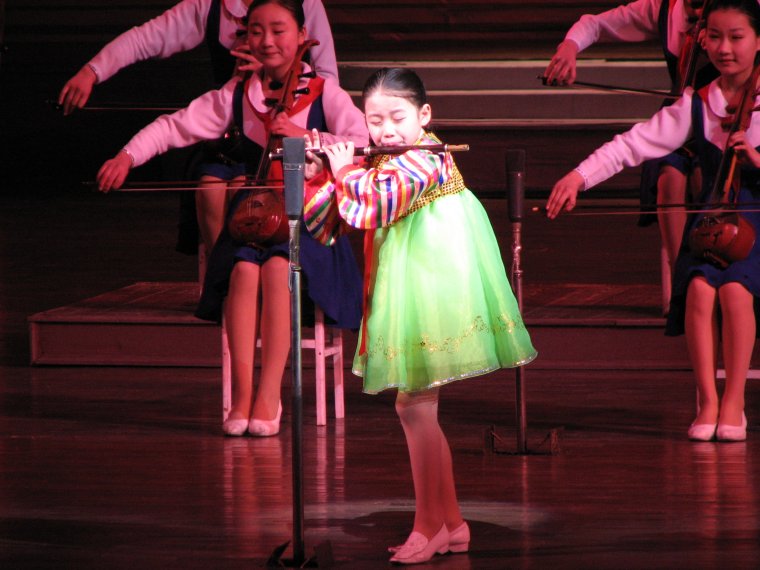
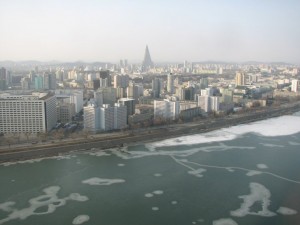
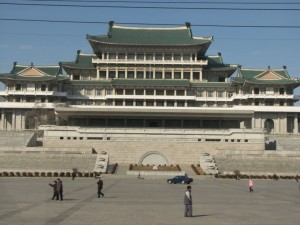
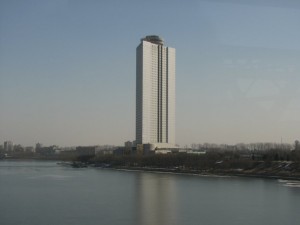
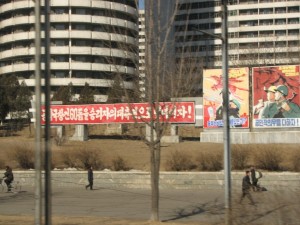
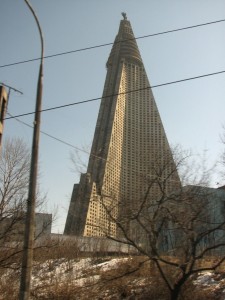
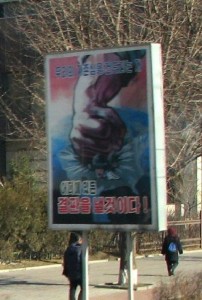
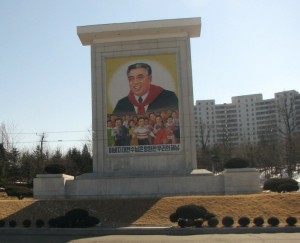
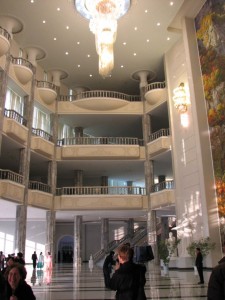
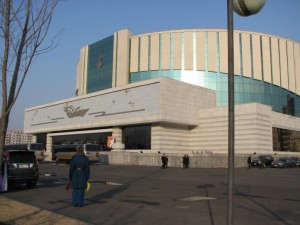
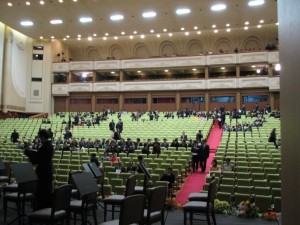
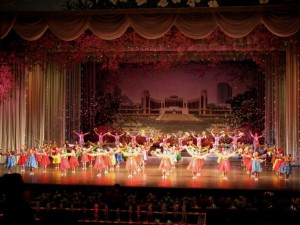
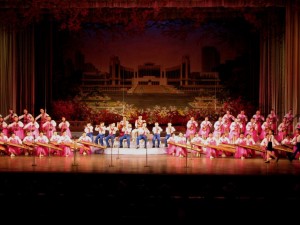
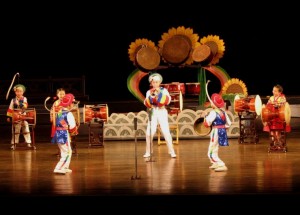
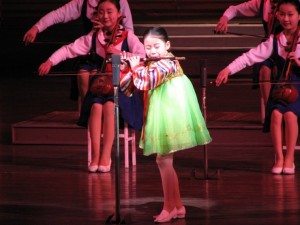
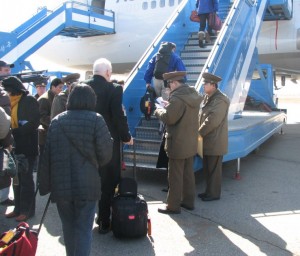
[…] email descriptions of the trip to several friends. He later agreed to edit these emails into an article for Polyphonic, detailing a fascinating glimpse into an isolated society. When the NY Philharmonic […]